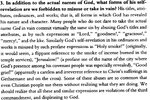Puritan Sailor
Puritan Board Doctor
Question for practical application:
It has become commonplace in Western culture, and sadly even in much of the Church to voice outrage, frustration, or shock by using God's names in vain, minced oaths, or other crude profanities. I was exposed to this a lot while serving in the Navy decades ago, but now it seems even the common population is learning to "swear like a sailor" in normal conversation, most likely reinforced by entertainment media. Obviously, these corrupt utterances have no place in a Christian's mouth (or heart).
But what would be an appropriate way to voice outrage or shock in the moment without profanity or cursing? Is it possible to do such in a righteous way, or should we just seek to remain silent, and direct our hearts to God, until we can say something edifying? Much of this involves Paul's exhortation to "be angry and not sin" and "let no corrupt word proceed from your mouth" (Eph. 4).
Appreciate any insights from you all.
It has become commonplace in Western culture, and sadly even in much of the Church to voice outrage, frustration, or shock by using God's names in vain, minced oaths, or other crude profanities. I was exposed to this a lot while serving in the Navy decades ago, but now it seems even the common population is learning to "swear like a sailor" in normal conversation, most likely reinforced by entertainment media. Obviously, these corrupt utterances have no place in a Christian's mouth (or heart).
But what would be an appropriate way to voice outrage or shock in the moment without profanity or cursing? Is it possible to do such in a righteous way, or should we just seek to remain silent, and direct our hearts to God, until we can say something edifying? Much of this involves Paul's exhortation to "be angry and not sin" and "let no corrupt word proceed from your mouth" (Eph. 4).
Appreciate any insights from you all.

